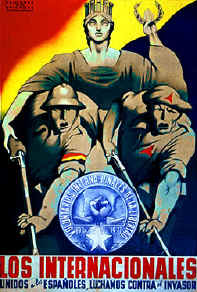
The last noble cause?
W.H. Auden famously celebrated September 1, 1939, sitting:
… in one of the divesAbout the same time, another (and more consistent) old Bolshie was finishing off Malcolm’s favourite novel. Howard Spring’s Fame is the Spur is the story of John Hamer Shawcross, born in the back-streets of Ancoats, and rising through the Labour Movement to become a Labour MP, and Cabinet Minister. The story ends with (the now Lord) Shawcross contemplating his new-born grandchild. Shawcross has lived to rue his lifetime’s achievement: his only son estranged and dead, fighting for the Spanish Republic, while the world sinks into the greater conflict of a World War.
On Fifty-second Street
Uncertain and afraid
As the clever hopes expire
Of a low dishonest decade.
Malcolm usually has watering eyes by that point.
The foreshadowing is implicit in the novel’s title, taken from Milton’s Lycidas:
Fame is the spur that the clear spirit doth raiseSpring subtly starts Shawcross’s story in the streets of back-to-backs that Engels described in 1844. It ends, predictably, in Mayfair. The book is usually seen as a fictional version of the life of Ramsay MacDonald, whose illegitimacy, loss of a loved wife, and indulgence in high society Shawcross shares. It also borrows from the life of Philip Snowden (a Yorkshire constituency, the suffragette connection and the Chancellorship).
(That last infirmity of Noble mind)
To scorn delights, and live laborious dayes;
But the fair Guerdon when we hope to find,
And think to burst out into sudden blaze,
Comes the blind Fury with th' abhorred shears,
And slits the thin spun life.
And, at this point, many readers (“I wish, I wish,” mutters Malcolm) might expect a standard denunciation of the class-traitors and betrayers of 1931. Nowadays, Malcolm is more generous of spirit. He does without the vitriol and the formulas of pre-processed pseudo-Marxism. These, he feels, were decent men, doing their best, taking the wrong advice, under enormous pressure. In any case, the successes of the Attlee Government were sown in the aftermath of the 1931 catastrophe.
But, back to the plot.
Auden went, briefly, to Spain, in 1937. He made a few broadcasts. He wrote a poem:
They clung like burrs to the long expresses that lurchLater Auden would turn apostate, and delete the poem from his life’s work. But in those lines he had captured the moment, the momentum. When Malcolm was forming his own ideologies, Spain was the legend. International Brigaders were titanic figures who still (in the early 1960s) walked among us. So Malcom read Orwell, and Hemingway, that fat newly-published history by Hugh Thomas, Gerald Brenan and Koestler (naturally, in a dusty Left Book Club edition). That led to John dos Passos, and to The Wall (Sartre’s magnificent short-story) and that led to … and so on. And Malcolm recognised in the Brigaders, like Hamer Shawcross’s son, those well-meaning middle-class lads, like himself, with heavy dialectical chips on their shoulders.
Through the unjust lands, through the night, through the alpine tunnel;
They floated over the oceans;
They walked the passes. They came to present their lives.
On that arid square, that fragment nipped off from hot
Africa, soldered so crudely to inventive Europe;
On that tableland scored by rivers…
When Malcolm was recently in Dublin, he learned of the death of Mick O’Riordan. It was encountering Mick, Johnny Nolan and (just the once) Peadar O’Donnell that made Malcolm see that Spain was not just effete (if admirable) bourgeois and edgy writers getting their rocks off. These were truly working-class heroes. And Malcolm’s entrée was through his class-mate Séan Edwards, the son of another Brigader, Frank Edwards. The Irish involvement in the Spanish Civil War is being celebrated by Ciaran Crossey's fine site.
One of the focuses of Malcolm’s world, even more than the lecture-room or the library, was New Books in Pearse Street. This was where Johnny Nolan presided. Or in his absence it could be the formidable Mick. Here Malcolm could get his regular fix of Tribune or International Socialism or New Left Review. New Books would sell the political list of Penguin Books, or nationalist song books, or the blue-bound, gold-blocked Moscow Printing House copies of Capital and Lenin, indiscriminately. It always amused Malcolm that such subversion existed cheek-by-jowl with the Special Branch in Pearse Street Gardai station.
And the point of all this? One of the books that Malcolm brought back from Dublin was Bob Doyle’s Brigadista, an Irishman’s Fight against Fascism. Bob is the last Irish Brigadista. His fight was not only in Spain: he had already practised on O’Duffy’s Blueshirts, and went on to tussle with Robert Maxwell. His description of his attempts to get to Spain are worth the entry-fee alone, and lend weight to Auden’s summary. Then, on page 44, out of nowhere dropped a name:
At the beginning of 1937 I was with Alec Digges and others who were working for Spain ..When Malcolm removed to north London, in the mid-1970s, Malcolm found himself sharing a pub with another Dubliner, Alec Digges. Alec had served with the International Brigade in Spain and then lost a leg on the Normandy beach-head with the Grenadiers. To the end Alec had the ram-rod posture and the bristle moustache of the Guardsman.
And so Malcolm raises a glass to those who had a noble cause: Mick and Johnny; Frank and Alec. These were Milton’s clear spirits who were not seduced by personal fame or glory. In the hostile environment of Ireland of the Bishops, they certainly had to scorn delights, and live laborious dayes, before, during and long after their Spanish excursion. Even so, their tales have been preserved, and are deserving of the telling. We shall not see their like again. Sphere: Related Content





No comments:
Post a Comment